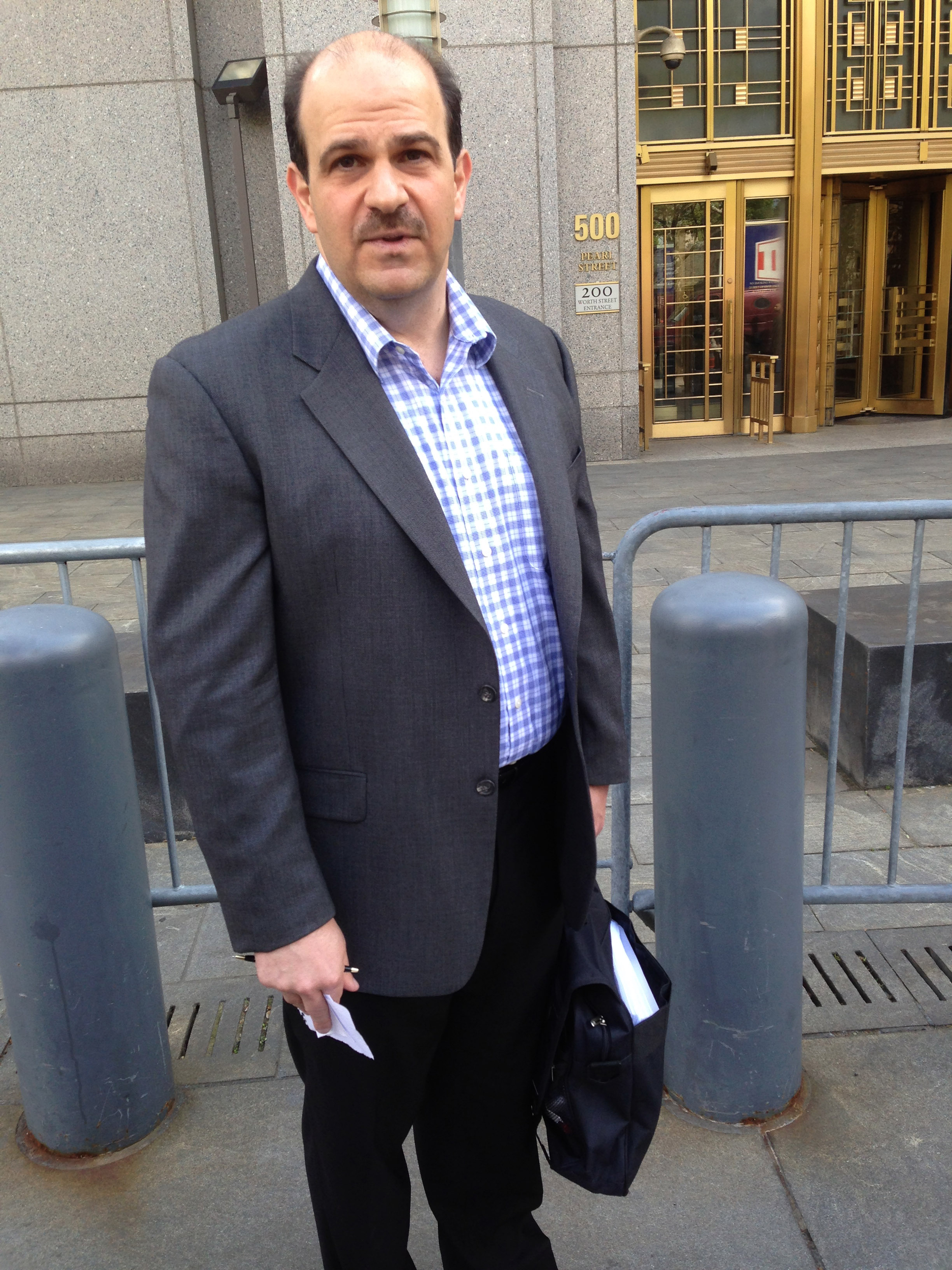NY jurors follow facts to London imam's conviction
Tuesday, May 20, 2014
 Howard Bailynson, 44, jury foreman in the trial of Mustafa Kamel Mustafa, makes a statement outside of Manhattan federal court in New York after the Egyptian Islamic preacher was found guilty on Monday, May 19, 2014. Bailynson said Mary Quin, one of the two women held hostage, who also testified, was a "great woman" for having the courage to confront Mustafa with a tape recorder.
Howard Bailynson, 44, jury foreman in the trial of Mustafa Kamel Mustafa, makes a statement outside of Manhattan federal court in New York after the Egyptian Islamic preacher was found guilty on Monday, May 19, 2014. Bailynson said Mary Quin, one of the two women held hostage, who also testified, was a "great woman" for having the courage to confront Mustafa with a tape recorder.By LARRY NEUMEISTER
Associated Press
and TOM HAYS
Associated Press
NEW YORK - The jury foreman who announced guilty verdicts against an Egyptian Islamic cleric extradited from London to face terrorism charges says jurors kept emotions about terrorism out of deliberations.
"I never had 9/11 enter into my decision-making process," Howard Bailynson said as he stood outside the Manhattan federal courthouse just blocks from the World Trade Center site after Monday's verdict finding Mustafa Kamel Mustafa guilty of all charges.
During a month-long trial, jurors heard a tape in which Mustafa said: "Everybody was happy when the planes hit the World Trade Center."
The jury deliberated two days before concluding the 56-year-old imam provided material support to terrorist organizations by giving a satellite phone to kidnappers of tourists in Yemen in 1998, by supporting plans to open an al-Qaida training camp in Bly, Oregon, and by sending someone to an Afghanistan training camp.
As he had after the conviction two months earlier of al-Qaida's spokesman following the Sept. 11 attacks, Attorney General Eric Holder used the verdict to boast that civil courts were better than military tribunals for terrorism cases.
"His conviction is as just as it was swift," Holder said. "With each efficiently delivered guilty verdict against a top al Qaeda-linked figure, the debate over how to best seek justice in these cases is quietly being put to rest."
Bailynson said jurors relied on factual evidence including a taped interview of Mustafa conducted by a former Yemen hostage rather than footage of Mustafa delivering the kind of fiery sermons that attracted extremists to his London mosque.
Bailynson, a 44-year-old Xerox Corp. employee from suburban Westchester County, said Mustafa "was not tried on his words."
Joshua Dratel, a defense attorney, disagreed, saying the verdict was "not about the evidence but about a visceral reaction to the defendant."
"It's unfortunate that's what happened, and it's what we feared," he added.
The imam was extradited in 2012 from England, where he led London's Finsbury Park Mosque in the 1990s, reportedly attended by both Sept. 11 conspirator Zacarias Moussaoui and shoe bomber Richard Reid. Mustafa denied ever meeting them.
The white-haired Mustafa looked straight ahead as the verdict was read. Sentencing was set for Sept. 9, when he likely faces life in prison.
When he testified at his trial, Mustafa was calm, speaking confidently in the tone of a college professor while denying involvement in terrorism or aiding al-Qaida.
His testimony was derided by Assistant U.S. Attorney Ian McGinley, who warned jurors not to "be fooled."
In his closing, McGinley read aloud the names of four European tourists who died in 1998 in Yemen after their convoy of cars was overtaken by extremist Islamic kidnappers. McGinley said a guilty verdict would provide a measure of justice for them and another dozen hostages who survived.
"Don't let the passage of time diminish what he did," he said.
Referred to by prosecutors and defense lawyers alike by his alias, Abu Hamza al-Masri, Mustafa told jurors about losing both hands, an eye and part of his forearms in a 1993 accident when he helped the Pakistani military as a civil engineer.
Two former hostages in Yemen also testified.
The government played clips of a taped interview one woman, Mary Quin, a U.S. citizen who now lives in New Zealand, conducted with Mustafa in his London mosque as she prepared to write a book about the kidnapping. McGinley told jurors Mustafa boasted to Quin about the kidnappings, saying: "Islamically, it is a good thing."
McGinley said that statement belied Mustafa's claims that when he spoke to the lead kidnapper during the crisis, he tried to be a peacemaker.
"No one who actually tried to be a peacemaker would say to a victim of that kidnapping that it was a good thing," he said.
Bailynson, the juror, called Quin, who also had worked for Xerox, a "great woman" for confronting Mustafa with a tape recorder.
He said it took "an extreme amount of courage on her behalf."
And he cited statements she elicited from Mustafa indicating he had known in advance of the hostage taking as influential on the jury.
"He never planned on it being part of the case against him," Bailynson said.
Associated Press writer Jill Lawless in London contributed to this report.
